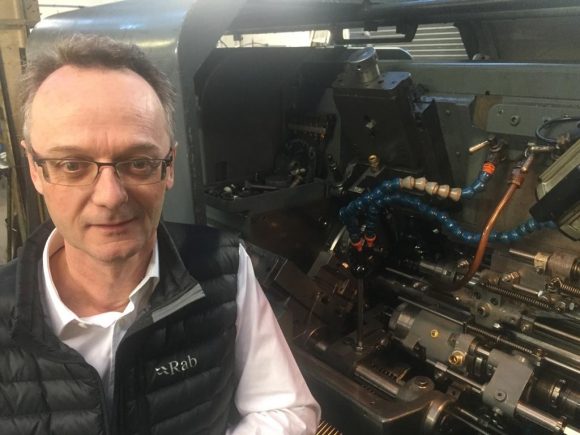Our guest on today’s podcast is David Taylor, owner of Machine Tool Spares, one of the world’s most respected rebuilders of Wickman multi-spindle screw machines.
Machine Tool Spares is based in Coventry, England, the birthplace of Wickman machine tools. His company turnkeys Wickmans and sells Wickman spare parts all over the globe. David shared his views on the role of cam multi-spindles and Great Britain in today’s machining industry.
Scroll down to listen to the podcast.
Main Points
(3:00) David talks about his company, Machine Tool Spares. The company provides Wickman multi-spindle spare parts, service, rebuilt and turnkey machines around the world. He says the company’s mission is to keep the Wickman cam machines relevant in the modern world. He says his company stretches the capabilities of the machines to do applications never achieved before using Wickman cam machines.
(5:00) David says that Machine Tool Spares is the independent alternative to Wickman Group, also located in Coventry, England.
(6:30) David says Wickman usage in the UK is continuing to decline. He this is due to less people with skills to run the machines, and because people are put off by the length of changeover time between jobs on the machines. David says his company is finding growth in India, Europe, and Scandinavia.
(11:00) David says Machine Tool Spares is doing much less selling of machines in “as-is” condition and more rebuilt and turnkey machines for customers’ specific applications. He says customers have higher standards for parts and want to buy machines that are ready to make high quality, consistent parts as soon as the machine arrives on their floor, so every machine that is shipped out is tested for accuracy.
(12:15) Lloyd and David marvel at how old Wickman machines in poor condition continue to run good parts for decades. David attributes this to how robust Wickmans are.
(13:30) David says that customers in India are becoming more sophisticated and wanting to buy higher quality machines, rather than purchasing equipment primarily based on price. He talks about an unusual turnkey job Machine Tool Spares sold to India in which a company needed to machine a forged part.
(18:00) David says that often he has seen companies running very expensive CNC multi-spindles on certain simple jobs that a cam multi-spindle could easily handle. He says Machine Tool Spares does not retrofit Wickmans with CNC capability. Instead the company sometimes engineers customized attachments to accomplish complicated operations.
(12:40) David talks about another business he has a share in, a CNC Swiss shop running Citizens.
(22:30) David says Machine Tool Spares has not sold much equipment in China but has supplied Wickman spare parts there. He says even though that market is growing, his company hasn’t pursued it because it would require considerable resources.

(24:45-31:30) David talks about Brexit. He says that for the next year everything will stay the same in the UK, but next year Britain’s relationship with continental Europe could dramatically change depending on how the new trade deal is negotiated. He says that the EU is much more experienced at negotiating trade deals than Britain, which hasn’t negotiated a new trade deal independently in 40 years. He says he is pretty worried about the deal’s conclusion. In a worse case scenario he says he would even consider moving part of his company’s spare parts business into a facility in continental Europe.
David says the Brexit negotiation could dramatically effect Britain’s supply chain. He gives an example of a Nissan plant in northeast England, which has historically been one of the most productive car plants in Europe. He says Nissan holds half a day of stock there. It uses 5 million parts per day, 60% of which are imported. He says that if importing material into Britain becomes a slow and difficult process, businesses like Nissan may leave.
David says Brexit has significantly depreciated the British Pound. This is has been good for the country’s exports, but has disrupted the country’s imports.
(33:10) David says he enjoys Swarfcast because it’s nice to hear people talk about our industry. He says when he goes to dinner with friends he describes himself as “the dinosaur.” He says he is in a world his peers don’t understand because they don’t have the privilege of working with machines that are 40 to 50 years old.
Question: Can you make good money with old screw machines?
Podcast: Play in new window | Download

1 Comment
Yes, provided you can find competent staff to set them.
There’s the rub.